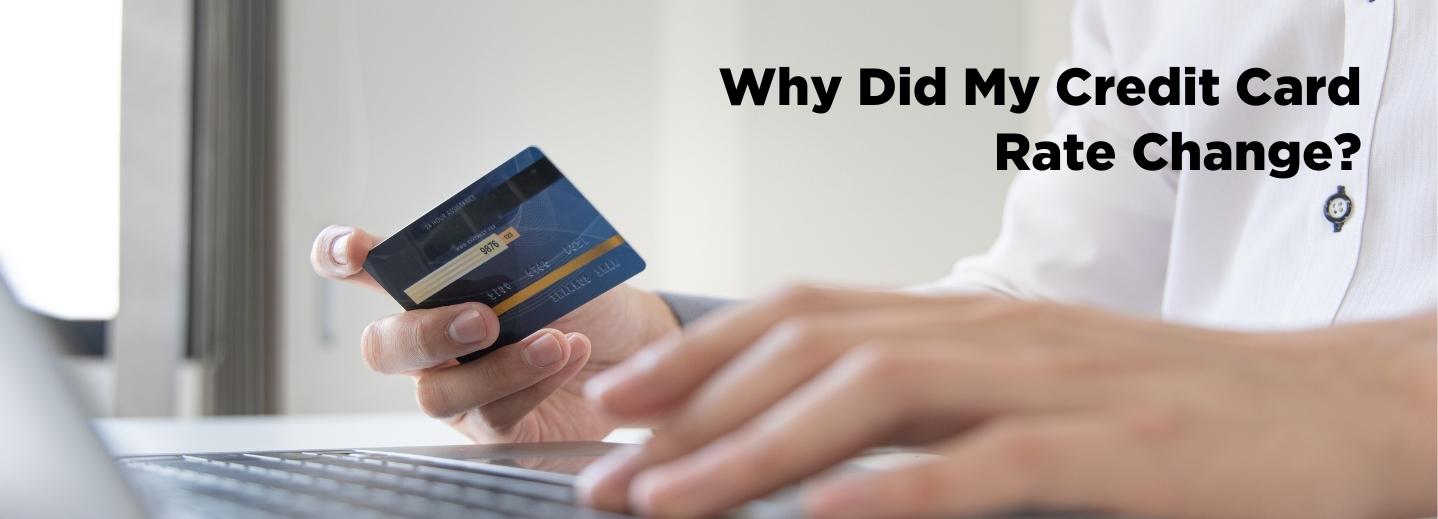Why Did My Credit Card Rate Change?

Have you ever opened your credit card statement and noticed the interest rate on your card increased? Your initial thought might be that your financial institution simply raised your rate out of the blue to earn more, but most of the time that’s not the case.
There are actually many reasons your credit card rate can fluctuate. The economy can play a major role in determining your current rate, and you can also impact the cost of your card. If you carry a balance on your credit card, it’s important that you understand what causes these changes and steps you can take to prevent being caught off guard should a rate change occur.
Reasons Your Interest Rate Changed
The most common reasons your credit card interest rate can change are listed below. However, if you are still unsure of the fluctuation, a quick call to your financial institution will help you determine the cause.
- Your promotional rate ended. You may qualify for a special introductory rate when you initially open your credit card. These promotional rates offered by lenders are usually for a specific period of time – typically between six to twelve months. Once that time frame passes, the interest rate on your card will switch to the actual rate you received when you opened the card. If you’re using a promotional rate to help pay off existing debt, make sure to repay the entire balance before the introductory period ends to avoid extra interest costs.
- Your card has a variable rate. Today, most credit cards utilize variable rates, meaning the interest rate can vary. Lenders use variable rates to help protect themselves against fluctuations in the economy. To do this, they tie your interest rate to the Prime Rate – a figure partially determined by the Federal Reserve. For example, your credit card rate might be 10% APR + the Prime Rate. If the Prime Rate is 3%, your current rate will be 10% + 3% = 13% APR. If the Prime Rate increases to 4%, your new credit card rate will also increase by 1% to 14% APR.
- Your credit score changed. Some lenders check the credit scores of all their cardholders periodically. If, upon reviewing your credit score, they notice your score has dropped, they may increase your interest rate. Many lenders do this to protect themselves if you become a higher-risk borrower.
- You made one or more late payments. Most credit card issuers will have a late-payment penalty APR within their policies and account agreement. Meaning that if you’re late on a payment, your card could default to this higher rate. Typically, penalty rates go into effect if you’re more than 60 days late on your credit card payment, but they will vary by institution. In addition to paying a penalty APR, you may also have to pay late fees.
- You performed a balance transfer. Many financial institutions offer a special rate for balance transfers. Meaning if you move your existing balance from one or more credit cards to this new card, you may qualify for a lower rate on the amount transferred. Many people make the mistake of believing this special rate covers new purchases as well. Balance transfer promotional rates only cover the amount transferred – all new purchases will be charged the actual interest rate you were approved for when you opened the credit card.
- You borrowed through a cash advance. A cash advance is when you use your credit card to withdraw cash – similar to an ATM card. Cash advances typically have much higher interest rates than your traditional spending rate. You should only use a cash advance in emergencies because it can be costly and lead to unhealthy spending habits.
Takeaway
Credit cards are one of the most convenient forms of payment available today. However, we recommend you monitor your balance and interest rate so that you can create a plan to repay your outstanding balance quickly and without added interest costs.
While some changes to your credit card rate are out of your control, such as fluctuations in the economy or promotional rates expiring, you do have control over other possible rate increases. For example, always make at least your minimum payment to avoid penalty rates and refrain from using cash advances outside emergencies. Maintaining a good credit score will also prevent possible rate increases by your lender in the future.
CAMPUS Can Help!
It’s important to remember that credit cards are still loans despite the lure of rewards or promotional rates. When choosing a credit card, your top priority should be to obtain a card that best fits your goals from an institution you trust.
Whether you are interested in learning how to consolidate high-interest debt through a balance transfer, or you want to open your first credit card, our team can help you get started. Please stop by any of our convenient service center locations, call 800-367-6440, or apply online today.
More Resources:
How a Credit Card Balance Transfer Works
By CAMPUS USA at 30 Mar 2022, 14:37 PM